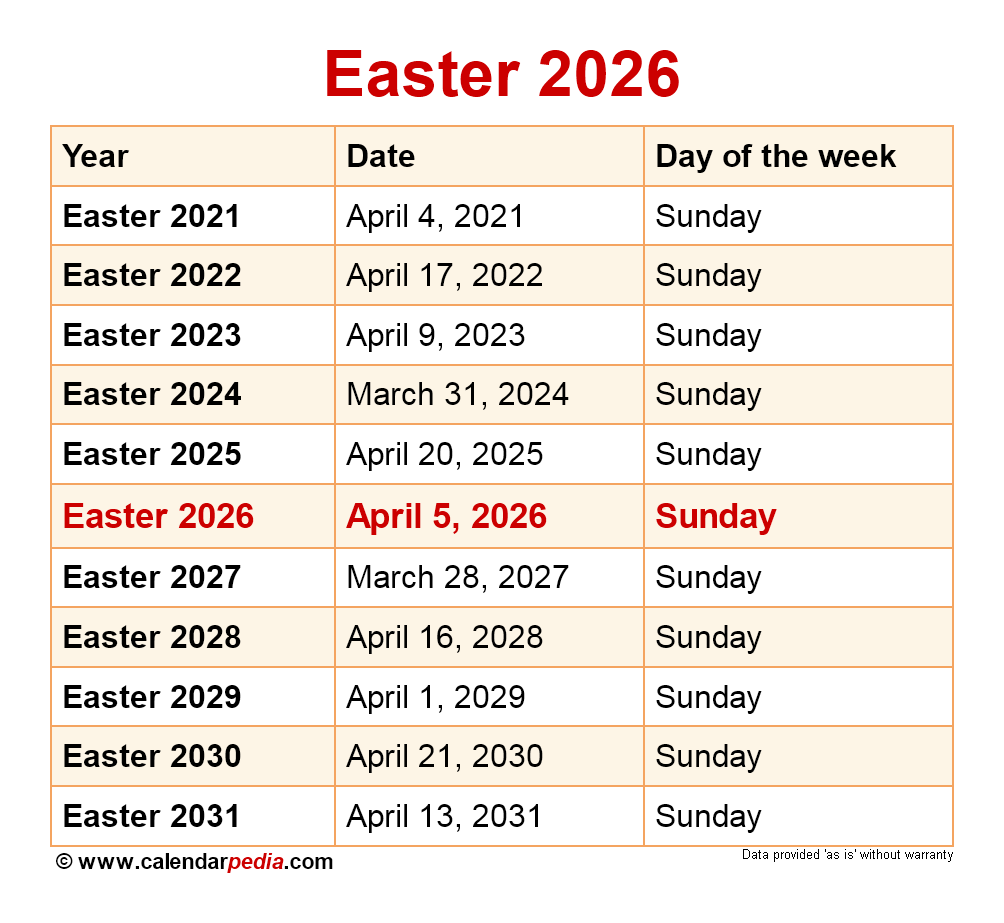Unraveling The Mystery Of Future Easter Dates
Easter is one of the most celebrated holidays across the world, symbolizing rebirth and renewal. It is a day filled with joy, family gatherings, and various traditions that vary from culture to culture. However, one question remains constant each year: when is Easter? As we look forward to future Easter dates, it becomes essential to understand how the date is determined, its significance, and the traditions associated with it. In this article, we will explore the future Easter dates and take a closer look at how they are calculated, along with interesting insights into the holiday's rich history.
Every Easter Sunday falls on a different date, making it a holiday that keeps us guessing. The anticipation surrounding Easter often leads families to plan their celebrations well in advance. Whether it's organizing an Easter egg hunt for the kids or preparing a festive meal, knowing the future Easter dates can be crucial for effective planning. In addition, understanding the importance of Easter in various cultures provides context to the significance of this holiday.
As we dive deeper into the future Easter dates, we will answer some common questions about the holiday's history, traditions, and observances. From its origins to how it has evolved over the centuries, this article aims to provide a comprehensive guide that will not only enlighten you about future Easter dates but also help you appreciate the celebrations that accompany them.
What Are the Future Easter Dates?
The future Easter dates can be determined using a formula established by the Council of Nicaea in 325 A.D. Easter Sunday is celebrated on the first Sunday after the first full moon that occurs on or after the vernal equinox. As a result, Easter can be celebrated as early as March 22 and as late as April 25. Here are the upcoming Easter dates for the next few years:
- 2024: March 31
- 2025: April 20
- 2026: April 5
- 2027: March 28
- 2028: April 16
How Is the Date of Easter Calculated?
The calculation of Easter's date is based on a combination of solar and lunar calendars, making it unique among holidays. The Church uses the ecclesiastical approximation of the March equinox, which is fixed on March 21. The full moon that follows is known as the Paschal Full Moon. The date of Easter is then the following Sunday, which can lead to a wide range of dates.
Why Does Easter Change Every Year?
The variability of Easter dates often raises questions among people. The primary reason for this fluctuation lies in its dependence on the lunar calendar, unlike most holidays that follow the solar calendar. This means that Easter can be observed on different dates each year based on the cycles of the moon.
Are There Any Significant Traditions Associated with Easter?
Yes, there are numerous traditions associated with Easter around the world. Some of the most popular practices include:
- Easter egg hunts
- Decorating eggs
- Church services
- Feasting with family and friends
These traditions not only enhance the festive spirit but also create lasting memories for families and communities.
What Is the Significance of Easter?
Easter holds profound significance for Christians as it commemorates the resurrection of Jesus Christ. This event symbolizes hope, renewal, and the promise of eternal life. Many people attend church services to reflect on the spiritual meaning of the holiday and participate in various rituals that honor this important event.
How Do Different Cultures Celebrate Easter?
Different cultures have unique ways of celebrating Easter, incorporating local customs and traditions. For instance:
- In the United States, Easter egg hunts are a popular activity for children.
- In Italy, people celebrate with a festive meal known as "Pasqua," which includes lamb, eggs, and traditional pastries.
- In Australia, the Easter Bilby has replaced the Easter Bunny in some regions to promote awareness about endangered species.
What Are Some Fun Facts About Easter?
Here are some intriguing facts about Easter that you might not know:
- The largest chocolate Easter egg was made in Italy in 2011, weighing over 15,000 pounds.
- The tradition of the Easter Bunny is believed to have originated from German immigrants in the 1700s.
- In many countries, Easter Monday is also a public holiday.
How Can You Prepare for Future Easter Dates?
Preparing for future Easter dates can be both fun and rewarding. Here are some tips to help you get ready:
- Mark the Easter date on your calendar and plan your family gatherings.
- Start gathering materials for Easter decorations and crafts.
- Plan your Easter meal and make a shopping list to ensure you have all the ingredients.
- Consider organizing community events or volunteering to help those in need during the holiday.
Conclusion: Embracing the Joy of Easter
As we look ahead to the future Easter dates, it’s essential to appreciate the rich history and diverse traditions that come with this joyous holiday. Whether you are celebrating with family, friends, or your community, understanding the significance of Easter can enhance your experience. By being aware of the future Easter dates, you can ensure that your celebrations are well-planned and filled with love, joy, and togetherness.
Understanding What Is Easter In 2024: A Celebration Of Renewal


![Summer Series 6!, Images (26) iMGSRC.RU [UPDATED]](https://i2.wp.com/cdn.statcdn.com/Infographic/images/normal/8959.jpeg)